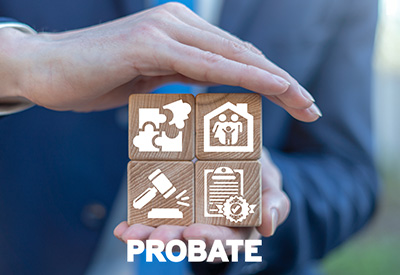The probate process, a crucial yet often misunderstood aspect of estate settlement, presents significant challenges for many Americans. Recent studies reveal a widespread lack of awareness regarding the complexities, costs and time involved in probate proceedings. This knowledge gap leaves millions of families vulnerable to unexpected delays, financial burdens and privacy concerns when managing a loved one's estate. As the baby boomer generation ages, understanding the intricacies of probate and exploring alternative estate planning strategies has become increasingly vital. This article delves into the often-overlooked realities of probate, shedding light on why Americans consistently underestimate its impact and offering insights on how to navigate or avoid this complex legal process.
What is probate and why is it necessary?
Probate is the legal process of administering a deceased person's estate, validating their will (if one exists) and distributing assets to beneficiaries. It's intended to ensure that the deceased's wishes are carried out, debts are settled and assets are properly transferred to heirs. However, experts say many Americans are unfamiliar with the intricacies of probate, leading to misconceptions about its purpose and requirements.

Probate is typically required when an individual dies owning assets in their name alone, without beneficiary designations or joint ownership. The process involves several steps, including:
- Filing the will with the probate court.
- Appointing an executor or personal representative.
- Notifying creditors and beneficiaries.
- Inventorying and appraising assets.
- Paying debts and taxes.
- Distributing remaining assets to beneficiaries.
While probate can be straightforward in some cases, it often becomes complex, time-consuming and expensive, especially for larger estates or when disputes arise among beneficiaries.
How long does the probate process typically take?
Americans tend to underestimate the time required to complete the probate, which can be a lengthy process, often lasting anywhere from six months to several years depending on various factors:
- Estate complexity. Larger estates with diverse assets or business interests typically take longer to settle.
- Family dynamics. Disputes among beneficiaries can significantly prolong the process.
- Court backlogs. Overloaded probate courts may cause delays in scheduling hearings and approving documents.
- Asset liquidity. Selling real estate or other illiquid assets can extend the timeline.
- Creditor claims. Resolving outstanding debts and potential claims against the estate takes time.
The underestimation of probate's duration can lead to frustration and financial strain for beneficiaries who may be counting on their inheritance. It's crucial for individuals to have realistic expectations about the probate timeline and plan accordingly.
The probate process involves several stages, each contributing to the overall timeline:
- Prepare and file the probate petition (1-4 months). This initial step involves filing the will with the probate court and appointing an executor or personal representative. The executor must send an official notice of probate to beneficiaries and creditors.
- Provide notice to creditors (3-6 months). Creditors must be notified of the decedent's death and given an opportunity to make claims against the estate.
- Payment of debts and fees (6-12 months). The executor is responsible for paying all outstanding debts and taxes from the estate's assets.
- Asset inventory (6-12 months). An inventory of the estate's assets is compiled, including real estate, bank accounts, investments, and personal belongings.
- Distribution of assets (9-18 months). Once debts and taxes are paid, the remaining assets are distributed to beneficiaries according to the will or state intestacy laws.
- Closing the estate (9-24 months). The final step involves closing the estate, which includes filing a final accounting with the court and obtaining a discharge order.
What are the typical costs associated with probate?

Another area where Americans may demonstrate a lack of understanding is the cost of probate. One recent survey found that 56% of respondents have no idea about the costs involved.
In reality, probate expenses can be substantial, often ranging from 3% to 8% of the total estate value. For a $500,000 estate, this could mean probate costs between $15,000 and $40,000. These expenses typically include:
- Court filing fees.
- Attorney fees.
- Executor or personal representative fees.
- Appraisal and accounting costs.
- Bond premiums (if required).
- Publication of legal notices.
The misconception about probate costs can lead to inadequate financial planning and potential conflicts among beneficiaries when faced with unexpected expenses. It's essential for individuals to consider these potential costs when creating their estate plans and to discuss them openly with their families.
What are the main challenges faced during the probate process?
The probate process can present numerous challenges, many of which are underestimated by the general public. Some of the main challenges faced during probate include:
- Emotional distress. Dealing with legal and financial matters while grieving can be overwhelming for family members.
- Time commitment. Executors often spend countless hours managing estate affairs, which can be particularly burdensome if they live far from the deceased's residence.
- Family conflicts. Disagreements over asset distribution or the interpretation of the will can lead to costly and time-consuming legal battles.
- Creditor claims. Identifying and resolving outstanding debts can be complex, especially if the estate is insolvent.
- Tax implications. Navigating estate taxes and ensuring proper filing of final income tax returns can be challenging without professional assistance.
- Asset management. Maintaining and protecting estate assets during the probate process requires careful attention and can be costly.
- Legal complexities. Understanding and complying with probate laws and court procedures can be daunting for those without legal expertise.
These challenges underscore the importance of proper estate planning and the potential benefits of probate avoidance strategies, such as living trusts.
How does probate affect the privacy of the deceased and their beneficiaries?

Many Americans are unaware of the privacy implications of probate. The process typically makes a significant amount of personal and financial information publicly accessible, which can have various consequences for the deceased's estate and beneficiaries.
When a will is filed with the probate court, it becomes a matter of public record. This means that anyone can access information about:
- The deceased's assets and their value.
- Beneficiaries and their inheritances.
- Debts and creditors.
- Family relationships and potential conflicts.
The lack of privacy in the probate process can lead to a range of significant issues for beneficiaries and the deceased's estate. One of the primary concerns is the increased vulnerability to scams. When information about inheritances becomes publicly available, it can make beneficiaries prime targets for fraudsters and unscrupulous individuals seeking to exploit their newfound wealth.
Furthermore, the public disclosure of asset distribution can often exacerbate existing family tensions or even create new conflicts. Family members may become resentful or disappointed upon learning the details of the inheritance, potentially leading to strained relationships or legal disputes.
Beneficiaries may also find themselves inundated with unwanted solicitations. Financial advisors, real estate agents and other professionals may aggressively pursue those who have recently inherited assets, hoping to secure their business. This can be overwhelming and stressful for individuals who are already dealing with the loss of a loved one.
For high-profile individuals or families, the public nature of probate records can lead to unwanted media attention or scrutiny. This invasion of privacy can be particularly distressing during a time of grief and transition.
Additionally, if the deceased owned a business, the public disclosure of its value and operations through probate could potentially harm the company's competitive position. Sensitive information about the business might become available to competitors, potentially impacting its future success.
These privacy concerns associated with probate underscore the importance of considering alternative estate planning strategies. Options such as revocable living trusts can offer greater confidentiality and help mitigate many of these issues, providing a more private and secure way to transfer assets to beneficiaries.
How to avoid probate and probate complications

Given the widespread lack of understanding about probate, it's crucial for individuals and families to take proactive steps to avoid – or at least prepare – for this potentially complex process. Here are some strategies to consider:
- Educate yourself. Take the time to learn about probate laws in your state and understand the basic steps involved in the process.
- Create a comprehensive estate plan. Work with an experienced estate planning attorney to develop a strategy that aligns with your goals and potentially minimizes probate complications.
- Consider probate alternatives. Explore options like living trusts, transfer-on-death designations and joint ownership to potentially avoid or simplify probate.
- Communicate with family members. Discuss your estate plans with beneficiaries to reduce the likelihood of conflicts and misunderstandings after your passing.
- Organize important documents. Keep your will, financial records and other important documents in a secure, easily accessible location, and inform your executor of their whereabouts.
- Review and update regularly. Revisit your estate plan periodically, especially after major life events, to ensure it remains current and reflects your wishes.
- Choose your executor wisely. Select a responsible, trustworthy individual to manage your estate, and consider naming an alternate in case your first choice is unable to serve.



